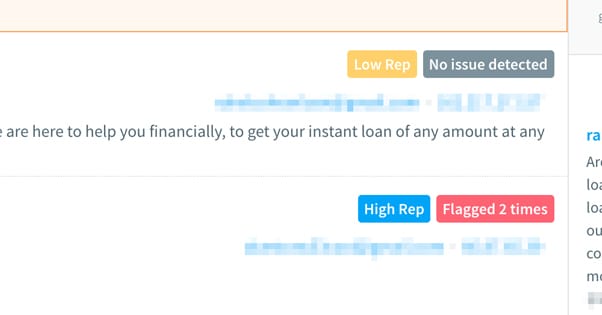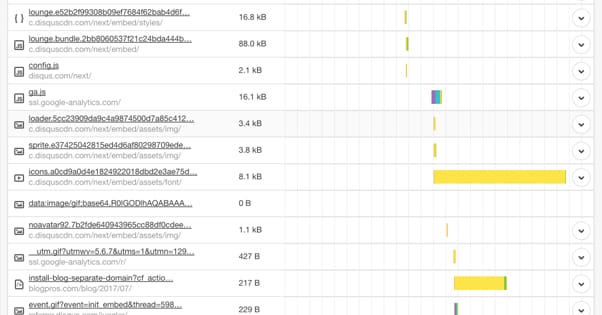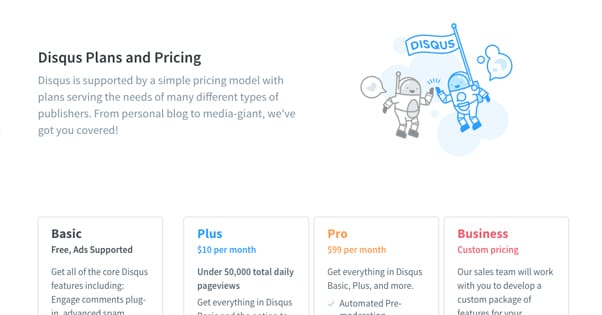Does The Disqus Comments Plugin Slow Your Site Down?
Published by Drew Hendricks • Search Engine Optimization • Posted July 23, 2017 ContentPowered.com
ContentPowered.com
When you run a blog using WordPress, you have a handful of different options for comments. You can run the native comments system, and optionally add in something like Akismet to filter out the spam. You can run a SEO-scheme plugin like CommentLuv, to try to get some added value from an external community. You can link up your social media presence and use the Facebook comments system. Or you can run a global “social media comments system” like Disqus, in an attempt to make it easier for users to comment and keep their identity across different sites.
The Benefits of Disqus
Disqus is one of the first and one of the largest commenting plugins available. This means the primary benefit of using it is the widespread adoption. A ton of people have a Disqus account, even if they haven’t logged into it recently; when they go to comment on your blog, they will likely log in, and that will bring them into the fold.
Disqus allows people who comment on blogs around the web to be logged in when they arrive on your site, so they can skip all the rigmarole of logging in or creating an account. They have their profile information, including bio, picture, and links, already set up. Of course, if they’re new to Disqus, they will have to set up all of this the first time they use the site, and they certainly might not. That’s why a lot of Disqus comments use one of the default avatar images and have no information beyond a username set up. However, serious commenters already have all that information squared away.
This has the secondary benefit of easily allowing you to identify the people who are most seriously engaged with blog comment communities, just based on the information they have filled out in their profiles.
Disqus integrates with social media, particularly so that users can create a Disqus account just by logging in through one of their social media sites. This will pull and fill out some basic information, making the onboarding process a lot easier.
Now, if you’re thinking “Facebook comments do all of that without adding another account to the mix” you’d be right. If the user is logging in through Facebook, there’s not much difference between using Disqus and using Facebook comments for that user, other than the fact that Facebook comments are posted to Facebook as well. You don’t get that added layer of integration with Disqus.
Disqus does have an added encouragement that Facebook comments do not, and that’s anonymity. Back in 2012, TechCrunch reported that 61% of all comments made using Disqus were made under pseudonyms. With Facebook, you need to comment under your profile, which often means your real name and information. This can discourage people from commenting, if they don’t want certain groups of people to know about their associations with other groups of people. It could be embarrassing for a user to comment on an atheist blog when their friend circle is primarily Christian. It could also be potentially deadly to comment on a LGBT+ blog when their friends/family are primarily not accepting of such lifestyles. This doesn’t come up for a lot of blog types, but some might want to consider the impact of sharing activity on Facebook.
Disqus also offers widgets to extend the functionality of the plugin. By default, Disqus tracks user reputation across all of their activity. You are able to set up moderation such that you need to approve comments if you have issue with spam, though Disqus does a good job of preventing a lot of the automated spam. You can create lists of banned users, and whitelists of users that can bypass the comment moderation process. You can even shadowban users, to block them from commenting but not let them know, so they don’t try to circumvent the ban. Widgets, then, include things like a “top commenters” leaderboard box for your blog, and other such expansions.
Another potential benefit is that some Disqus users are able to monetize the plugin, as an additional revenue stream. Be careful, of course, because this can conflict with AdSense or other monetization options, and it’s possible that you can step over the “too many ads” line and earn yourself a minor Google penalty for using ads this way.
One thing that is NOT a benefit of Disqus, however, is the speed of the plugin. I can easily say that it is one of the largest and most bloated of comment systems available for WordPress. That goes double if you use one of their widgets.
Does Disqus Slow Down Sites?
Any plugin will slow down a site compared to not having the functionality at all. So, if you compare a bare WordPress website that has comments disabled to a website that uses Disqus comments, the Disqus page will be slower.
When you have an empty website with no comments, and have default WordPress comments enabled, Disqus is likely going to be slower. However, when you have a number of comments – over a dozen or so – Disqus is likely going to be faster than the default WordPress comments.
This is due to two reasons. First, WordPress has a pretty lousy comment handling system by default. Primarily, they need to load the gravatars for each commenter in the chain, and that can take up a lot of back-and-forth server calls. Secondly, Disqus has plugins, like the conditional load plugin, that make the script only load when the user scrolls far enough down the page.
This, or just basic script lazy loading, means that Disqus doesn’t actually load until the user is ready to view comments. For most users – and most bots – that only load the top of the page, or only are concerned with the text of the blog post, the Disqus plugin never needs to load, so it doesn’t slow down the initial loading of the page.
Now, there are equivalent plugins that can speed up WordPress default comments, and they will make it faster than Disqus even when lazy loaded.
This is all conditional on a number of different factors. Other plugins and scripts can further speed up or slow down your site, as can the quality and order of the scripts you run and whether or not you load them asynchronously. If you’re running a CDN, it can vary from location to location as well.
In general, I would say that Disqus is going to be slower than most other comment systems, given an equivalent number of workarounds. If you have both Disqus and default comments lazy loading, default will be faster. If you have both Disqus and Facebook, Facebook will be faster, though if Facebook stutters in their server responses you might have an issue. It really all depends on your configuration.
Paid Versus Free
Disqus is one of the few comments plugins that has paid levels you can obtain. If all you want is the basic functionality, you can get a free version of Disqus, but that version is not actually free.
The trick is, “free” Disqus is supported by ad revenue from your site. Ad revenue that you do not see a penny of. Disqus runs ads in their plugin that you cannot remove or block, ads that display on your site without your ability to control, ads that pay to Disqus and not to you.
In my mind, that automatically makes the plugin completely worthless. I would never allow another plugin to monetize my site without me getting a sizable cut. I would want to negotiate my cut as well, though I know that with the Big Names like Google’s AdWords, I don’t really get that say.
If you want to get a no-ads version, you can get it for free, but only if your site as a whole is small, personal, non-commercial, and does not run any ads whatsoever. So, you know, if you don’t want to monetize your blog, you can get free comments without ads. Otherwise, that version is $10 per month. $10 per month to do what you can do for free just using the default WordPress settings or a free Facebook plugin. Oh, and did I mention, it has a traffic limit as well? You’re only allowed something like 50,000 pageviews per month as well, across your whole site. I hope you don’t go viral!
Now, if you want all of those additional modules, like the shadow banning and the analytics and the pre-moderation of comments? Then you need to upgrade to the pro version of Disqus, which is going to cost you $100 per month. You better have a sizable community and a great revenue stream to invest in this, because otherwise you’re just dumping all of your profits into a Disqus-shaped hole.
So, right away, this is a reason I would not recommend Disqus to most people. Sure, sometimes the $10 per month fee is minor enough, but even then, it’s limited. I don’t feel like it brings enough benefit to the table compared to other comment plugins to carry that weight.
Other Reasons to Avoid Disqus
Disqus is, of course, an external resource. Any time you have an embedded external resource on your site, you have to content with a bunch of issues. Even when lazy loaded, it will be more server calls to servers you can’t control, which slows down your site. Additionally, you can’t control caching as easily. Disqus doesn’t handle caching all that well, so it has to perform this load every time, rather than other comment plugins that keep most of the information cached and easily available for repeat visits.
Disqus is also difficult to customize. Disqus looks like it looks like, so if you have a non-standard template for your site, well, it’s going to stand out. This makes it easily recognizable for people who care about that kind of thing, but it means it might not readily match your design. A worse-looking design converts less often.
There are also issues if you want to move to a different comment solution later. You can import all your old comments into Disqus when you move to it, but if you want to move away, you might be out of luck. Smaller sites have more of a chance than larger sites in this case, but exports don’t always work and if they don’t, you’re out of luck. Who wants to have to turn a scraper on their own site just to harvest comments and somehow convert them to work with whatever new system you’re trying to use?
You always have issues with any third party system, where users might not want to jump through hoops to comment on your blog. It’s always a crapshoot to allow anonymous comments on your site, but with Disqus you have people who might want to comment only to find they no longer remember their password. Do they create a new Disqus account? Do they struggle to recover their information? Chances are they decide their comment wasn’t worth the effort and just leave. It leaves a bad memory in their mind, and they’ll be less inclined to bother next time around. There are always people who simply don’t want to care.
Oh, and there’s privacy to worry about. On one hand, you have the fact that it’s user information in a third party’s hands. They’re perfectly capable of keeping their servers secure against intrusion, right up until they aren’t. How many big data breaches have we heard about in the last few years? How many more will happen in the next? Disqus is a security concern you can’t control.
And that’s just if you keep user security in mind. On the other hand, Disqus might not even be keeping it secret at all. Disqus is aggregating user information the same way companies like Google and Facebook do, and likely selling it for profit. It’s not personal information, just aggregate data, but it’s still advertising information you’re providing to a company and not getting compensated for.
Even if Disqus works out to be a little faster in your particular situation, which would you rather do? Open yourself up to all these issues, or tweak a few settings to speed up whatever other plugin you want to use? I know my choice.









Excellent post sir